Items
Tag is exactly
pandemic
-
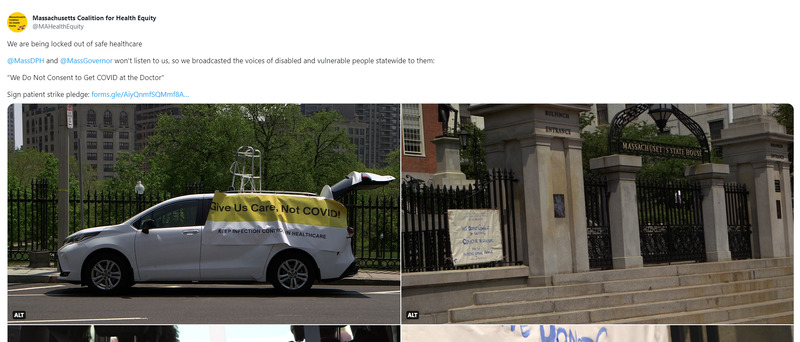 2023-05-14
2023-05-14Pandemics are Not "Great Equalizers" - Comparing COVID-19 to the Bubonic Plague Outbreak of 1870-1905
With the designation of COVID-19 as a "public health emergency" by the Centers for Disease Control and Prevention (CDC) ending as of May 11, 2023, public healthcare facilities throughout the US are rolling back protections they once employed to try to keep people safer during this ongoing pandemic. So, as this unit asks of us students, are pandemics the “great equalizers” in terms of social inequalities, and is there more equality now that the "emergency" has been deemed to be over? I argue that this is not the case, as immune compromised and disabled people have been more or less left for dead. A huge swath of healthcare facilities have removed mask mandates for care providers and hospital visitors, which leaves vulnerable and immune compromised people at a much higher risk of getting COVID-19 while receiving the medical care that is necessary for them to manage their conditions. In response, people and organizations, such as the Massachusetts Coalition for Health Equity in the tweet above, have begun to mobilize in favor of maintaining COVID-19 protections in healthcare settings by organizing strikes, protests, petitions, and phone banks to public officials. The reasons for maintaining COVID precuations such as mask mandates, access to COVID tests, and enhanced filtration in healthcare settings are clear. As the Massachusetts Coalition for Health Equity describes in their petition titled "Patient Strike Authorization Vote," the CDC "advises immunocompromised people to avoid crowded indoor settings, which now includes all healthcare institutions without universal masking," essentially maintaining that COVID is dangerous to immune compromised people while giving them no option but to risk exposure if they want to receive their necessary healthcare (Patient Strike Authorization Vote). The petition text explains that "[n]ational leaders in hospital epidemiology argue that universal masking should become the new standard of care, as gloves became with HIV" in order to keep people with compromised immune systems such as young children and elders safe (Patient Strike Authorization Vote). Currently, disabled and immune compromised people "are being locked out of safe healthcare" and are facing discrimination that makes them unwelcome and unsafe in healthcare settings (Massachusetts Coalition for Health Equity). In order to relate this modern COVID-19 pandemic to our course materials and demonstrate that discriminatory treatment during times of disease is not new, I will compare the above post to points from the text "The Chinese as Medical Scapegoats In San Francisco, 1870-1905" by Joan B. Trauner. This text discusses the discrimination against Chinese and other East Asian people living in San Francisco's Chinatown during a bubonic plague outbreak in the late nineteenth century. Sinophobic and anti-Asian sentiments, similar to those that arose during the epidemic Trauner details, have also been evident throughout the COVID-19 pandemic, so much so that even US President Donald Trump referred to COVID-19 as the "China virus." Ableism has also been prevalent throughout the COVID pandemic, as many people no longer care about the effects of the virus, because it harms disabled and immune compromised people most, especially people who also face racial discrimination in healthcare. Trauner explains that, because white people in the US believed the plague primarily affected Chinese and other Asian people, and because plagues were bad for business,"[t]he governor of California, Henry T. Gage, and executives of big business and of the large railroads, in conjunction with the San Francisco Board of Trade, the San Francisco Chamber of Commerce, and the Merchants Association, were all determined to prove that the plague did not exist in San Francisco" (78). The author of the Patient Strike Authorization Vote argues that today, we see a similar pro-business sentiment that comes at the expense of immune compromised people who are more likely to get sick with and die from COVID-19, writing: "Hospitals that remove masks and surveillance testing are making a value judgement about our lives, because they want to preserve their profit margins" (Patient Strike Authorization Vote). The CDC's ending of the COVID-19 public health emergency designation and the resulting halt of COVID mitigation procedures indicate that people are ignoring the needs of immune compromised people so that everyone can feel more comfortable going "back to normal" and maintaining consumption habits that are desired by businesses. Additionally, in both the past plague outbreak and the current pandemic, public health officials have shown hesitancy to give people vital information, which has led to harm. As Trauner explains, during the bubonic plague epidemic, "San Francisco Mayor Eugene Schmitz refused to approve the printing of health reports and vital statistics and even attempted to remove from office four members of the Board of Health who persisted in stating that plague existed in San Francisco" (79). Today, because the public health emergency designation ended on May 11th, 2023, the CDC is "no longer reporting aggregate cases and deaths, COVID-19 Community Levels, COVID-19 Community Transmission Levels, or COVID-19 Electronic Laboratory Reporting (CELR) data," all of which have been used to determine the severity of the situation throughout the pandemic (COVID Data Tracker). Meanwhile, over one thousand people are dying of COVID every single week, but COVID transmission levels are not being tracked, so people cannot know how many COVID positive cases there are in their county and how likely they are to contract the virus by going out in public (COVID Data Tracker). Another similarity between the COVID-19 pandemic and the bubonic plague outbreak of the late nineteenth century lies in the responses of the people facing discriminatory treatment in public health settings during these respective disease outbreaks. Trauner writes that before, during, and after the bubonic plague outbreak, Chinese businesses and health practitioners constructed and operated their own hospitals that would treat the people of Chinatown, because they were not welcome at other hospitals due to racial discrimination (81). Trauner explains that "[e]arly Chinese immigrants realized the necessity of banding together and providing for their own health care needs," in light of the government abandoning their health needs (81). Activists and organizations like the Massachusetts Coalition for Health Equity are currently banding together and fighting to get better and safer care for immune compromised people during the COVID-19 outbreak, as they are also facing discrimination at hospitals rolling back COVID precautions, because these spaces are not safe for them. The organizing they are doing to try to make healthcare settings safer for immune compromised people looks different, as no one is proposing the creation of immunocompromised-specific hospitals. They are fighting for better treatment, still, using slogans like "We Do Not Consent to Get COVID at the Doctor," and urging people that "[w]e must take collective action to prevent this mass violation of our human rights and federal rights to safe care," as stipulated under the Americans with Disabilities Act (Massachusetts Coalition for Health Equity). In both disease outbreaks, it has been the duty of those being discriminated against to take care of and advocate for themselves. So, in fact, pandemics are not "great equalizers"; in reality, they not only make pre-existing inequities even more visible, but exacerbate them even further. As Trauner argues, "Health policy [...] manifests not only the state of the medical sciences, but the expectations and the value system of society-at-large," and as such, if society-at-large is racist and ableist, then the health policies put into place will reflect these discriminatory values (70). These governmental measures come at a cost to everyone, and especially those facing racist and ableist discrimination. Had the nineteenth-century bubonic plague outbreak been determined an emergency and treated as a serious threat in spite of sinophobic and anti-Asian sentiments, perhaps more research could have been carried out sooner, and more lives could have been saved. If people in the US continue to take the COVID-19 pandemic seriously and not dismiss the pleas of immune compromised and disabled people to continue precautions, perhaps loss of life and further disablement from COVID infection can be mitigated. -
2020-03-13
March 2020
March 13, 2020 was a memorable day for all of us. It's the day we got the call that the schools would shut down for who knows how long due to the virus that was rapidly spreading. It was a scary time for everyone due to all of the unknowns. We were stuck in our houses for months with nothing to do. Being quarantined did teach me a lot of things, such as how to have fun at home. Once the restrictions got lifted, and we were allowed to see our friends, I remember spending everyday outside, finding our own ways to have fun since everything else was closed. 2020 was year none of us will forget. We found ways to make light of a horrible situation. -
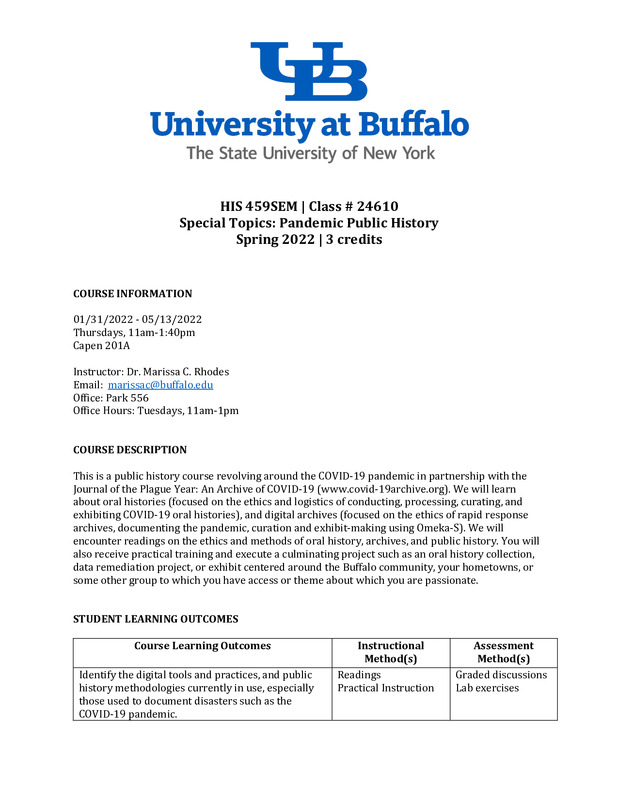 2022-01-31
2022-01-31Syllabus from University at Buffalo HST 459, Dr. Marissa Rhodes.
This is the syllabus from Dr. Rhodes' HST459 class at the University at Buffalo. From the syllabus: "This is a public history course revolving around the COVID-19 pandemic in partnership with the Journal of the Plague Year: An Archive of COVID-19 (www.covid-19archive.org). We will learn about oral histories (focused on the ethics and logistics of conducting, processing, curating, and exhibiting COVID-19 oral histories), and digital archives (focused on the ethics of rapid response archives, documenting the pandemic, curation and exhibit-making using Omeka-S). We will encounter readings on the ethics and methods of oral history, archives, and public history. You will also receive practical training and execute a culminating project such as an oral history collection, data remediation project, or exhibit centered around the Buffalo community, your hometowns, or some other group to which you have access or theme about which you are passionate." Students in the class submitted items to the archive, created oral histories and conducted projects within JOTPY. This will be linked to those items. -
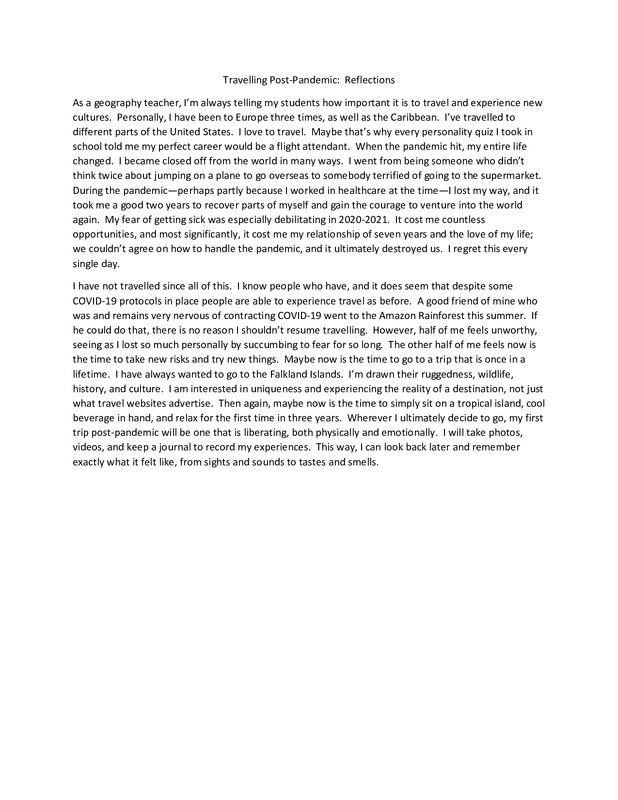 2023-01-29
2023-01-29Travelling Post-Pandemic: Reflections
Deciding whether or not to travel post-pandemic has been weighing on me emotionally. Here, I identify reasons I should vs should not travel, as well as where I would go and why. -
2020-05
Pandemic In Ohio
During the pandemic it was certainly a struggle for all of us. In my rather large town called Hilliard, many didn't take the pandemic seriously. People straight up just did not care about what was going on, and were even convinced it wasn't real. Even students were denying to wear masks in school. When in came to the point of complete isolation people were surprised, as if they didn't see it possibly happening. I want people to know that this is pandemic is 100% real and it cannot be taken lightly. -
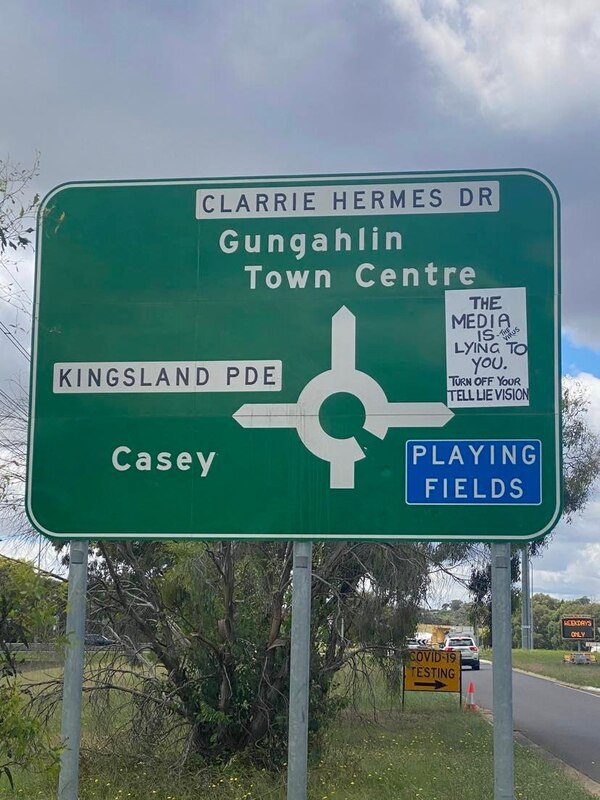 2022-02-04
2022-02-04HIST30060: Canberra Test Centre
This photograph depicts negative popular responses towards public messaging about the pandemic. On the Canberran road sign, a sticker reads, “The media is (the virus) lying to you. Turn off your tell lie vision.” At the bottom of the corner, a sign points towards a PCR test centre. This photograph was taken in February 2022. It is likely that this sticker was posted by a Freedom Rally protester. In January 2022, the Freedom Rally attracted thousands of protesters to Canberra in protest of the government’s response to the pandemic. The “Canberra Convoy” drove from all parts of the country to protest in front of parliament house. While the protesters’ concerns primarily revolved around the vaccination mandate and media censorship, the movement evolved to include all manner of political concerns, including housing affordability, the rising mental health crisis, religious freedoms et cetera. This photograph illustrates how the government measures and media coverage of the pandemic were not universally accepted but rather hotly contested in some places. The Freedom Rally, for example, attracted over 100,000 people to the nation’s capital. The photograph further shows popular anger towards the media coverage of the pandemic. The Australian Broadcasting Channel in particular attracted the ire of the anti-vaccination and anti-mandate movement for contributing towards increased fear of the virus and support for the vaccine. -
2020
A year of recovery
Our adult son died of cancer at the end of 2018. We were devastated. Our lives were disrupted and upended, while everyone else went on as if everything was normal. Anyone who has lost a family member or friend knows what this is like. Way too many people found out in 2020 what that is like. In 2020, other people were inconvenienced. A lot. I’ll acknowledge that it was tough on everyone, but it’s nothing compared to losing a loved one. When we realized that the pandemic disruption really didn’t faze us, we realized that we were going to be OK. We had faced the unbearable; this was trivial by comparison. So was losing my job. We were privileged that 2020 and 2021 gave us a chance to reset, to recharge, to reboot. To make ends meet, I now work and live on another continent, away from my wife. It’s incredibly difficult. We’ve dealt with worse situations. We’ll be OK. -
2020-05-17
Bells, Breezes, and Sirens
The warmest April on record, yet we were all stuck inside. The streets usually congested with the honks of angry black cabbies, the loud hum of overused mufflers on double decker buses and the low rumble of the tube running underfoot were silent. The metropolis of over nine million people had come to a standstill. Windows usually closed to protect against the sleet or smog, were opened to quiet clean breezes. London felt serene, almost idyllic, until the piercing siren of an ambulance run would cut through that fairytale. Before COVID I never paid attention to the St. John’s Ambulance First Aid Training facility on my street, only occasionally seeing the paramedics pop in the Arabic supermarket next door during lunch. As the news was counting the number of days we were in lockdown, I started counting the number of ambulances lining my street; popping my head out the open windows, looking up and down the road. However, sitting in my favorite chair in my flat, back to the window, I could avoid the grim sight, a constant reminder of the reality of the pandemic. I would take my tea in that purple chair, alternating between endless Netflix shows and books, the church bells across the street the only thing to remind me of time. The warm sun and smog less breeze would join the bells drifting through the open windows. Through the books and shows, I not only escaped COVID but my small London flat. The silence of the city amplifying my imagination, only to be shattered by that first initial scream of the sirens, jolting me back to reality. Willing to sacrifice the warm breeze at my back, I closed my windows to protect my ears and the fantasies I had created. However, the double paned windows, sturdy enough to block out the honks of angry black cabbies, were no match for the sirens. Unable to even slightly defend against the shock of the sirens when surrounded by the new silence of the city, I learned to live with it. I reopened my windows to let in bells, breezes, and sirens, instead tuning my ear to notice the ambulance’s first turn of the engine to brace for the piercing scream that would soon follow. As the days continued, my ears started to acclimate to this new normal, with each ambulance run making me jump a little less off my chair. Though my body and mind would never accept the sound enough to not to jolt me even from the deepest sleep, as if to remind me that this was anything but normal. -
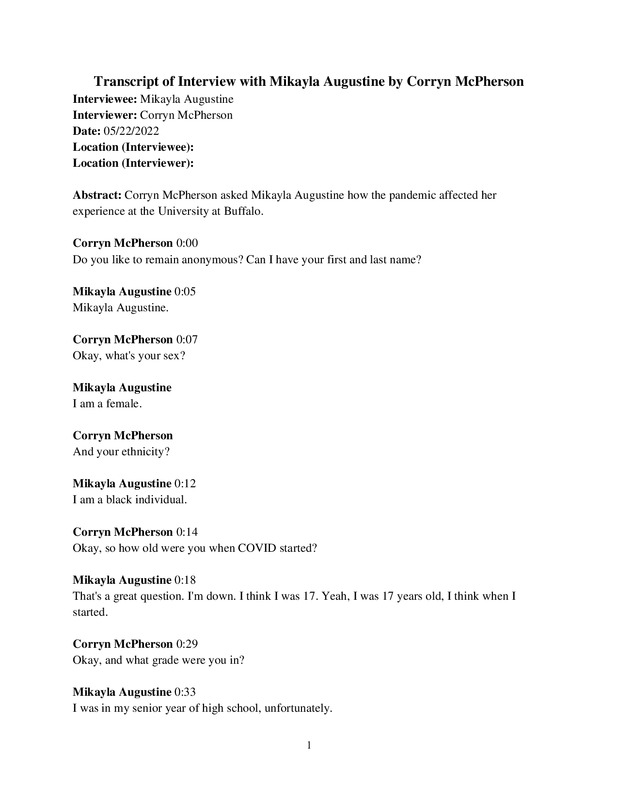 2022-05-15
2022-05-15Mikayla Augustine Oral History, 2022/05/22
I asked the interviewee how the pandemic affected her experience at UB -
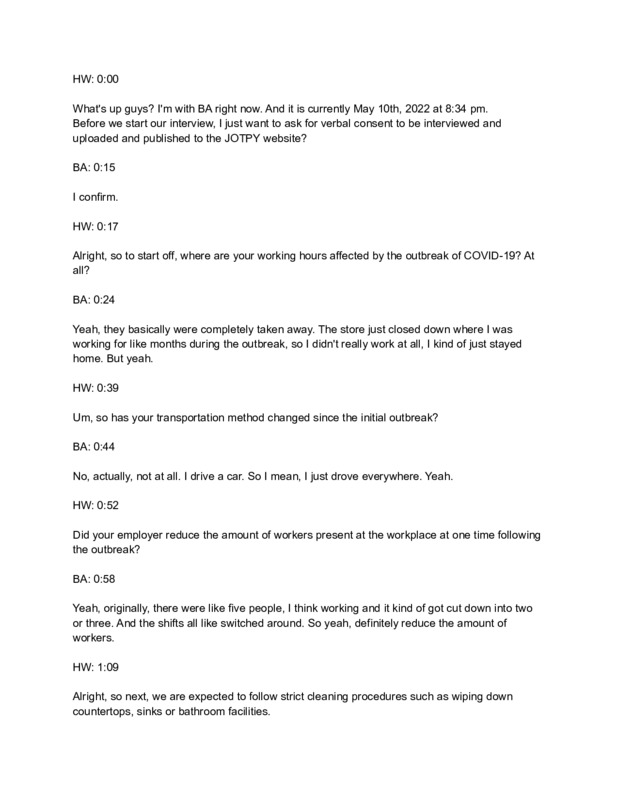 2022-05-10
2022-05-10BA Oral History, 2022/05/11
A student describes their experience working during the Covid-19 outbreak. -
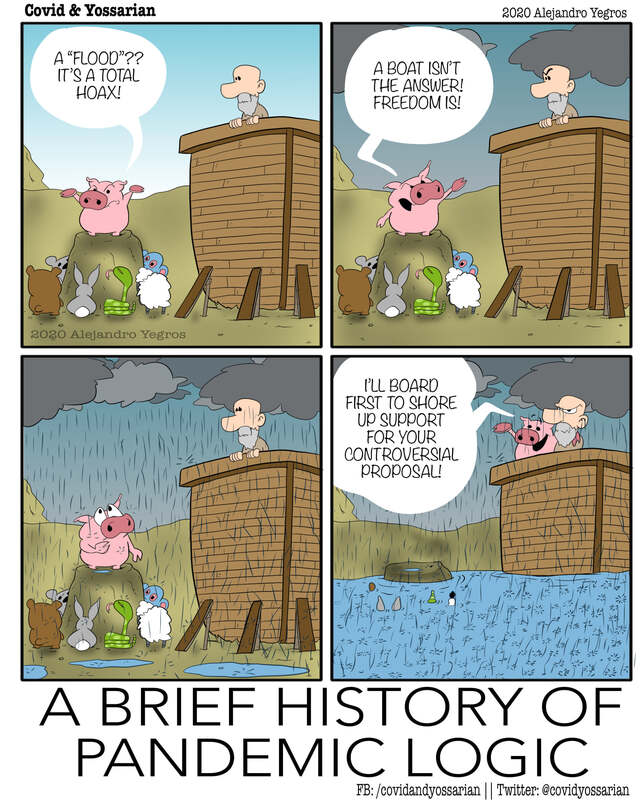 2020-12-22
2020-12-22Noah's Ark
A comic strip about Covid-19 -
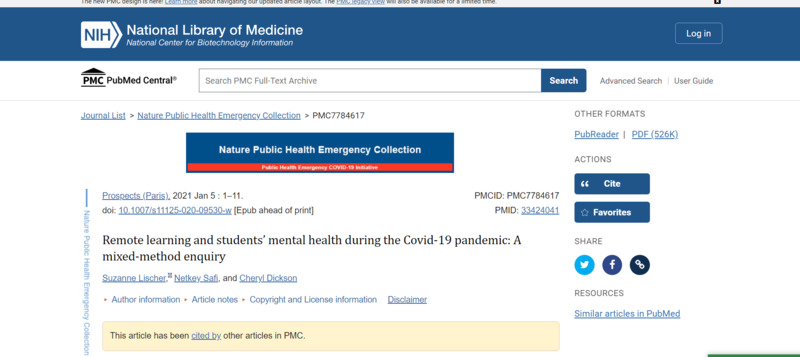 2021-01-05
2021-01-05The Covid Pandemic as a Senior in Highschool
The website that I am linking describes what happened to students all over the world in March of 2020 when all students in schools and universities had to go on lockdown and switch abruptly to complete online learning. This is an important covid-19 related topic to me because I was a senior in high school during that time, and I really struggled with my mental health, academic achievements, responsibilities, body image, and just overall my whole life. This article isn't as personal as it could get, but it gives a good historical and general idea of what student experience during the pandemic was like. -
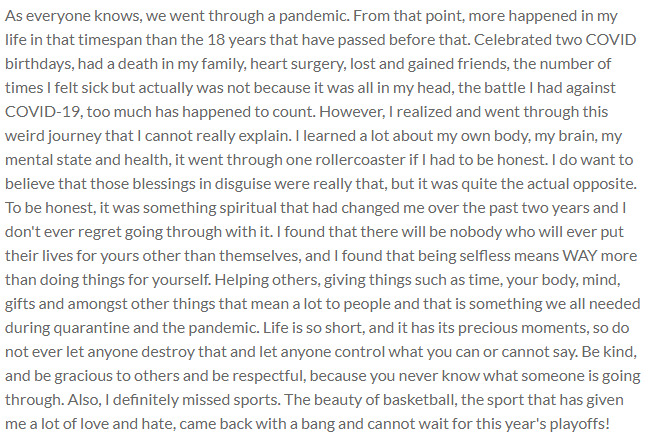 2022-04-10
2022-04-10Reflection of Life In A Pandemic
As everyone knows, we went through a pandemic. From that point, more happened in my life in that timespan than the 18 years that have passed before that. Celebrated two COVID birthdays, had a death in my family, heart surgery, lost and gained friends, the number of times I felt sick but actually was not because it was all in my head, the battle I had against COVID-19, too much has happened to count. However, I realized and went through this weird journey that I cannot really explain. I learned a lot about my own body, my brain, my mental state and health, it went through one rollercoaster if I had to be honest. I do want to believe that those blessings in disguise were really that, but it was quite the actual opposite. To be honest, it was something spiritual that had changed me over the past two years and I don't ever regret going through with it. I found that there will be nobody who will ever put their lives for yours other than themselves, and I found that being selfless means WAY more than doing things for yourself. Helping others, giving things such as time, your body, mind, gifts and amongst other things that mean a lot to people and that is something we all needed during quarantine and the pandemic. Life is so short, and it has its precious moments, so do not ever let anyone destroy that and let anyone control what you can or cannot say. Be kind, and be gracious to others and be respectful, because you never know what someone is going through. Also, I definitely missed sports. The beauty of basketball, the sport that has given me a lot of love and hate, came back with a bang and cannot wait for this year's playoffs! -
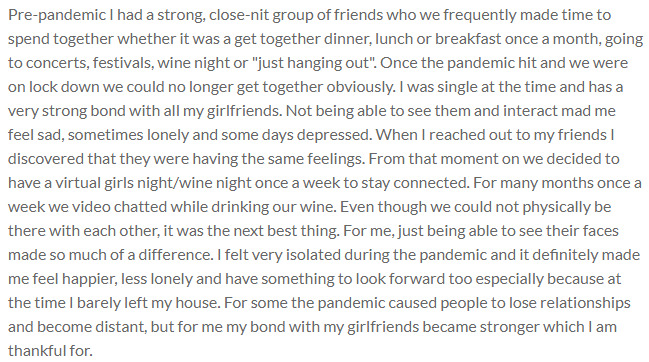 2022-04-10
2022-04-10How the pandemic brought together friendships
Pre-pandemic I had a strong, close-nit group of friends who we frequently made time to spend together whether it was a get together dinner, lunch or breakfast once a month, going to concerts, festivals, wine night or "just hanging out". Once the pandemic hit and we were on lock down we could no longer get together obviously. I was single at the time and has a very strong bond with all my girlfriends. Not being able to see them and interact mad me feel sad, sometimes lonely and some days depressed. When I reached out to my friends I discovered that they were having the same feelings. From that moment on we decided to have a virtual girls night/wine night once a week to stay connected. For many months once a week we video chatted while drinking our wine. Even though we could not physically be there with each other, it was the next best thing. For me, just being able to see their faces made so much of a difference. I felt very isolated during the pandemic and it definitely made me feel happier, less lonely and have something to look forward too especially because at the time I barely left my house. For some the pandemic caused people to lose relationships and become distant, but for me my bond with my girlfriends became stronger which I am thankful for. -
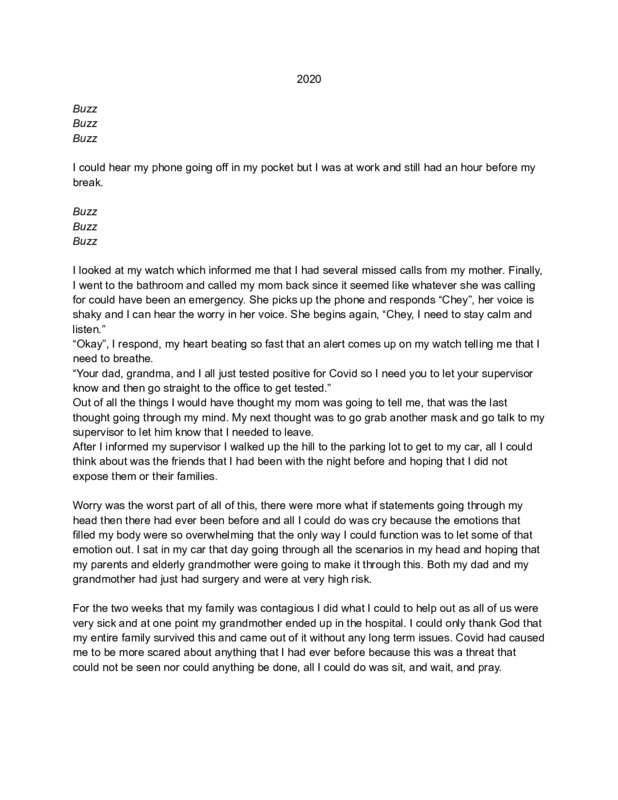 2020-06-21
2020-06-212020
This story shows my experience throughout the pandemic, it is important to me because it was an event that strongly impacted my life. -
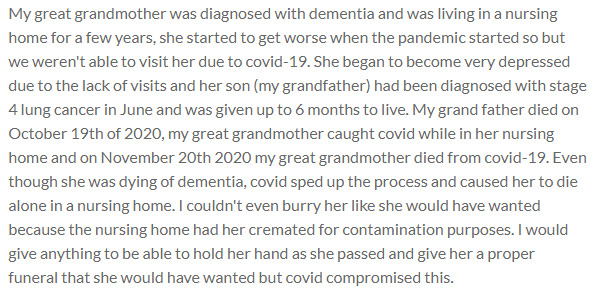 2022-04-09
2022-04-09Covid sped up my great grandmothers death
My great grandmother was diagnosed with dementia and was living in a nursing home for a few years, she started to get worse when the pandemic started so but we weren't able to visit her due to covid-19. She began to become very depressed due to the lack of visits and her son (my grandfather) had been diagnosed with stage 4 lung cancer in June and was given up to 6 months to live. My grand father died on October 19th of 2020, my great grandmother caught covid while in her nursing home and on November 20th 2020 my great grandmother died from covid-19. Even though she was dying of dementia, covid sped up the process and caused her to die alone in a nursing home. I couldn't even burry her like she would have wanted because the nursing home had her cremated for contamination purposes. I would give anything to be able to hold her hand as she passed and give her a proper funeral that she would have wanted but covid compromised this. -
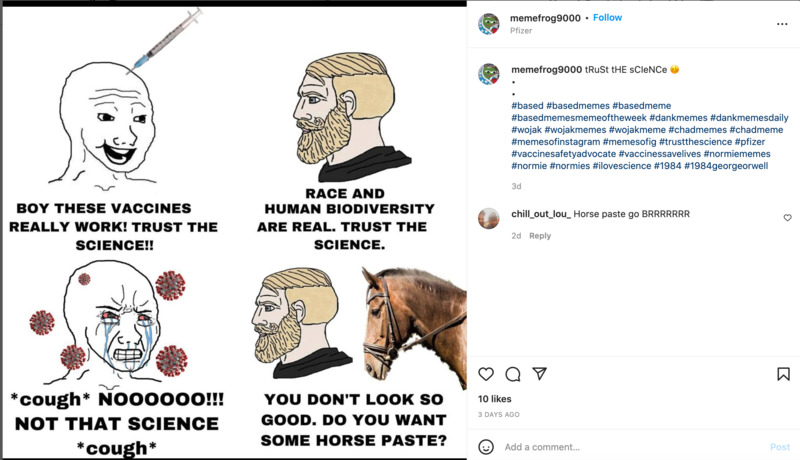 2022-04-04
2022-04-04Trust the Science
This is an Instagram post by memefrog9000. This is another meme where it depicts a soy wojak (the wojak on the left) and the Chad wojak (the wojak on the right with the blond hair). This meme is making fun of people like the soy wojak that "trust the science", only later to get the virus despite getting vaccinated. The Chad wojak then suggests the soy wojak use some "horse paste" to help. "Horse paste" refers to Ivermectin, which is used to treat horses. There has been controversy if Ivermectin does treat COVID, or other things in humans for that matter, but the FDA currently recommends against it. -
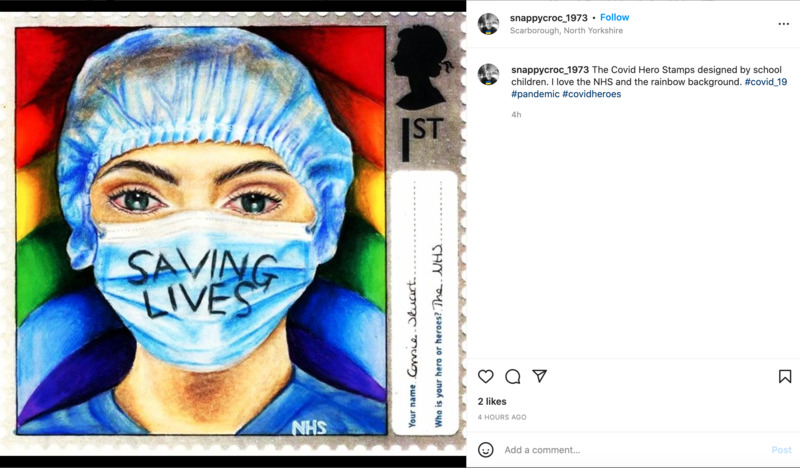 2022-04-07
2022-04-07COVID Heroes
This is an Instagram post by snappycroc_1973. This user posted a picture of one of the COVID Hero Stamps designed by school children. These stamps are meant to support the NHS (National Health Service), which is based in the United Kingdom. -
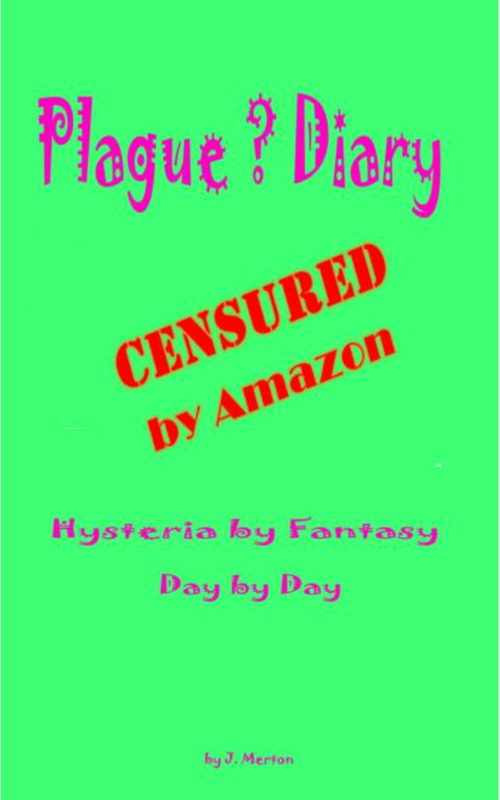 2020-01
2020-01Plague ? Diary
This is day by day account of the early stages of the pandemic. -
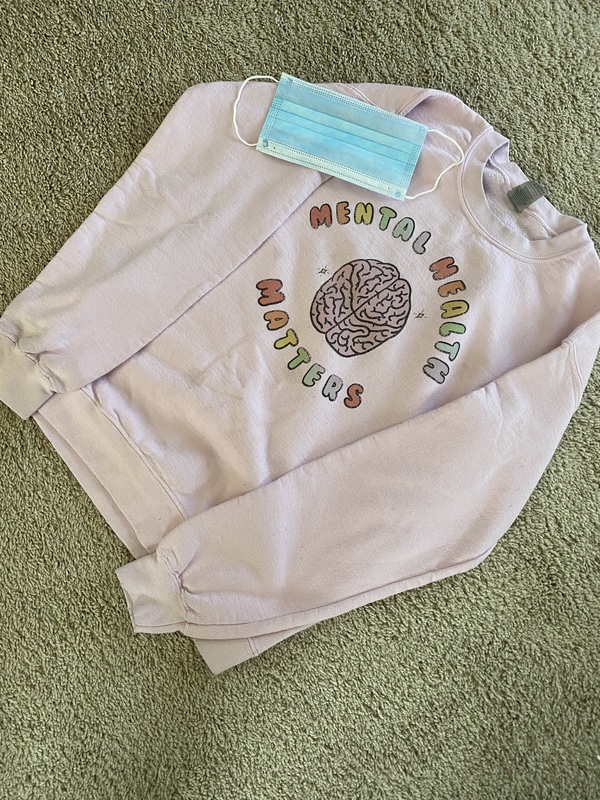 2022-03-26
2022-03-26Coping with the Pandemic--A Personal Look at Mental Health and COVID-19
According to the Center of Disease Control, in June of 2022, US adults reported considerably elevated adverse mental health conditions associated with COVID-19. Out of a survey they did on 5,412 people, 40.9 percent of respondents reported at least one adverse mental or behavioral health conditions, including symptoms of anxiety and depressive disorder which were around 31 percent. One of the causes of this is due to increase sedentary behaviors and low levels of physical activity due to quarantines and lack of business operation. Over the past two years, government mandated quarantine, work from home, and online schooling has caused me to stay at home for longer periods of time than what I use to. Because of this sedentary behavior, I had dealt with the negative effects of isolation, stress, and anxiety on both my mental and physical health. According to the World Health Organization, 150 minutes of moderate exercise or physical activity is usually recommended per week, however, with working a full-time job and being in school, the question that remains is how that is possible? I have learned to accommodate these physical needs indoors, by taking active breaks during the day and exercising at home. While this does not necessarily help with isolation and loneliness sometimes, I have learned to take these matters one day at a time and not shun myself for feelings them. CDC argues that from a recent comprehensive review that the impact of COVID-19 on mental health particularly seems to affect more young women disproportionally than any other group. Therefore, I recommend any young adult or women facing severe mental health to take advantage of online support or mental health services through telehealth such as ZocDoc. It is important to highlight COVID-19's impact on mental health in the United States and my personal life because it shows how the pandemic changed the means and the ways we received mental health services in the past. As the pandemic ventures on, people like myself will continue to have to find ways to cope and receive services for our problems. Thanks to the pandemic, much of our mental health problems have come more to the forefront due to us having ample amounts of time now to navigate and deal these issues unlike never before. -
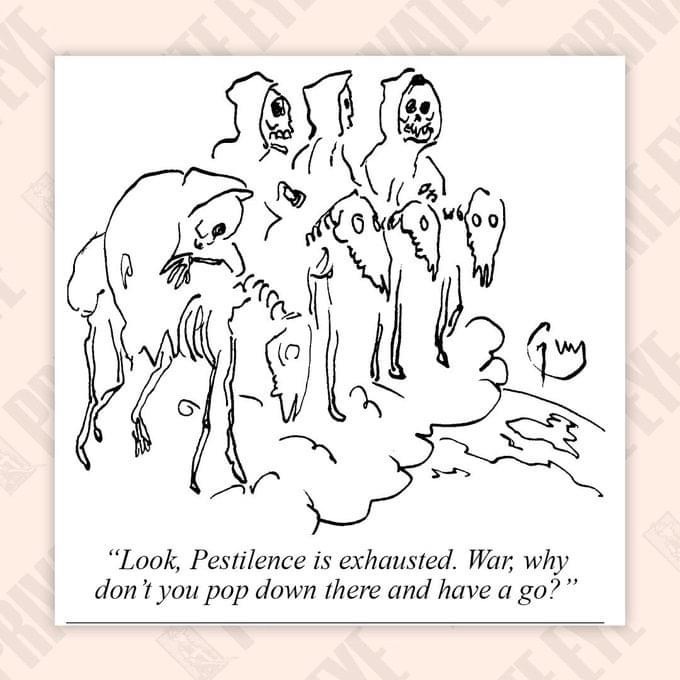 2022-03-05
2022-03-05War and pestilence
I saw this on facebook. In most people’s minds, Russia’s invasion of Ukraine is just a continuation of the rolling crises marked by the pandemic. -
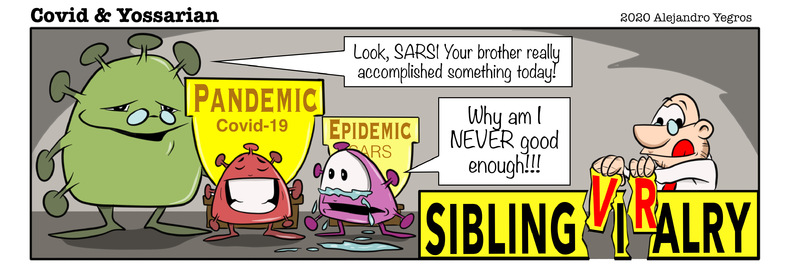 2020-04-03
2020-04-03My Brother's Keeper
A comic strip about Covid-19 -
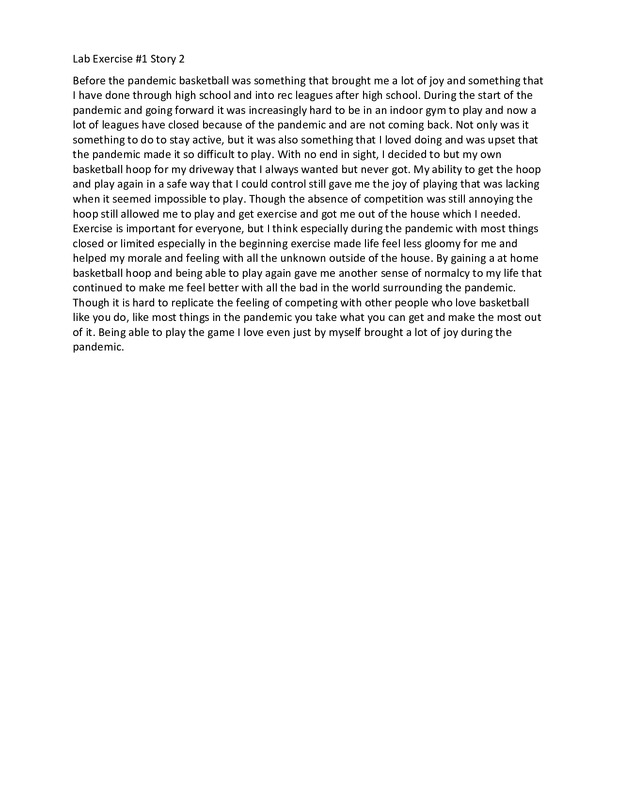 2022-02-06
2022-02-06Lost Basketball Season
What I was able to do when my ability to play basketball was limited during the pandemic. -
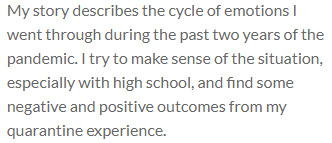 2022-02-07T10:00:00
2022-02-07T10:00:00Taking Covid-19 Step by Step
My story describes the cycle of emotions I went through during the past two years of the pandemic. I try to make sense of the situation, especially with high school, and find some negative and positive outcomes from my quarantine experience. -
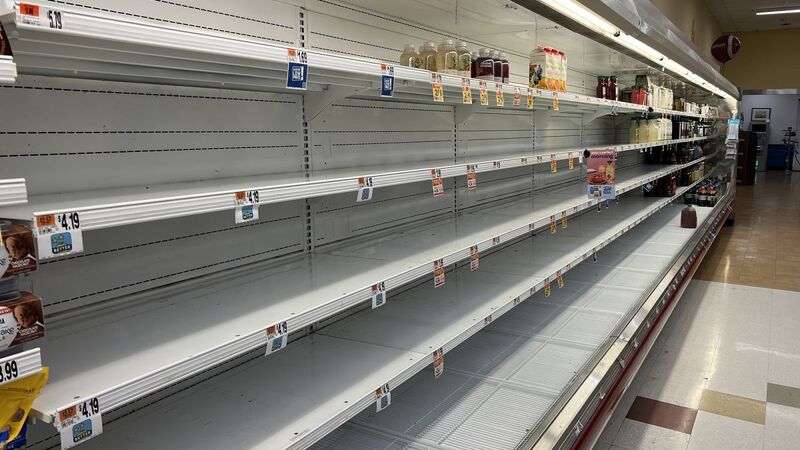 2020-03
2020-03Empty Shelves
My plaque story begins in March 2020, right in the middle of my senior year of my senior year of high school. that day we were let out of school for, what we were told, 2 weeks. One of my friends was away at a baseball camp that night and he had left his car in our school parking lot so me and my friends decided to go to the grocery store, buy a bunch of Saran Wrap, and Saran Wrap his car. At this point the amount that the pandemic would affect our lives hadn't sank in yet but when we got to the grocery store to buy the wrap we saw a very surreal sight. Hundreds of people were there wearing masks and gloves, and even goggles. People were buying canned food and toilet paper in mass quantities and there were numerous empty shelves. It looked like something out of a movie and that's when it began to sink in how crazy the situation was. that same week I remember going hiking with a couple of my friends and talking about the pandemic. I remember us wondering if anyone that we knew would end up getting the virus or if it would fizzle out before it hit Pennsylvania and if or when we would go back to school to finish our senior year. It turned out that we would never go back and "two weeks to slow the spread" turned into months and then years. It is now February 2022 and our lives are still being turned upside down by this pandemic. All we can do now is hope that things eventually return to normal and that we as humans can learn from the mistakes made during this pandemic. -
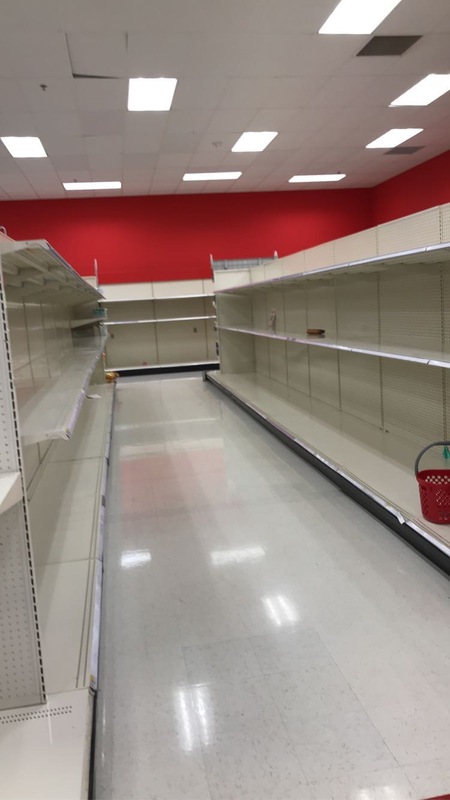 2020-03-17
2020-03-17An abundance of shortages
On March 17, 2020, I went shopping for the first time since schools and facilities closed nationwide just four days earlier. Much to my dismay, upon entering my local Target, I noticed that shelves in every part of the store were empty, however, I specifically remember shortages of canned goods, paper towels, and tissue paper. I continued to shop and collect what I could, all the while wondering what else would be in short supply in the coming days. During this time, families across the nation (including mine) began to ration food and focus on purchasing essential items when they became available. In retrospect, the mass shortage not only demonstrated how the pandemic impacted all parts of life, but it also revealed how accustomed Americans are to having various items available in abundance, which I believe is sometimes taken for granted. -
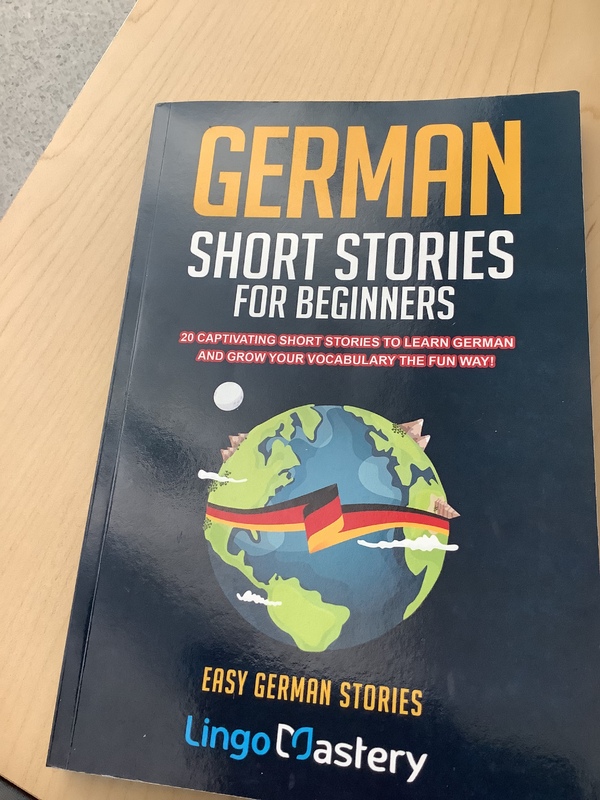 2020-03-28
2020-03-28What to do when stuck at home
Once the world shut down and everyone had to quarantine, I found that I had a lot of new found free time to deal with. Over the first few days I thought it was awesome, because I was able to relax at home and basically do nothing. After those beginning days, things started to get boring. I didn’t know what to do with myself. It took me a few days, but I began to look for more things I could do with my life. As a music major, I practice my instrument about 3-4 hours every day. I took advantage of my free time by putting in a lot of work on the horn which greatly helped my development. I have also been very interested in learning new languages. I decided to start learning German. So far I’ve been studying German everyday on my own since then. It has been very fun to read stories and news articles in German. I have also found a great podcast and YouTube channel that does an awesome job teaching German. I had also begun to exercise more during the pandemic. My friends and I would go on runs outside together. It was a great way to meet up with friends and be healthy. The pandemic was a very difficult time when it first broke out. Most people did not know what to do with themselves. There was a lot of sitting at home, watching television, or playing video games. I didn’t want to remember the time of the pandemic as a time where I didn’t improve as a person. I had decided to make these changes or improvements to better myself for when the pandemic was over. It has been a great lesson for me as the pandemic is still going on today. I have learned how to deal with difficult situations and also how to make the most out of them -
2020-04-01
Productivity
The meme I put describes my productivity during covid. A lot of people including myself lacked productivity and slept a lot during the pandemic and quarantine times. There wasn't much to do for people work and school wise so they were less productive. -
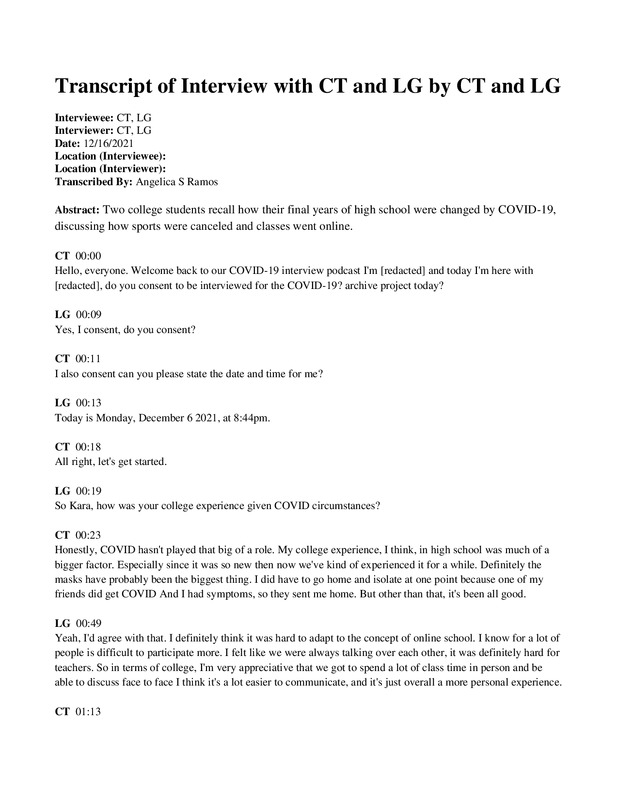 2021-12-16
2021-12-16CT and LG Oral History, 2021/12/16
This is the second part of a podcast by two college students. In this part they discuss the similarities they have found in how they experienced COVID and what they learned about past pandemics. -
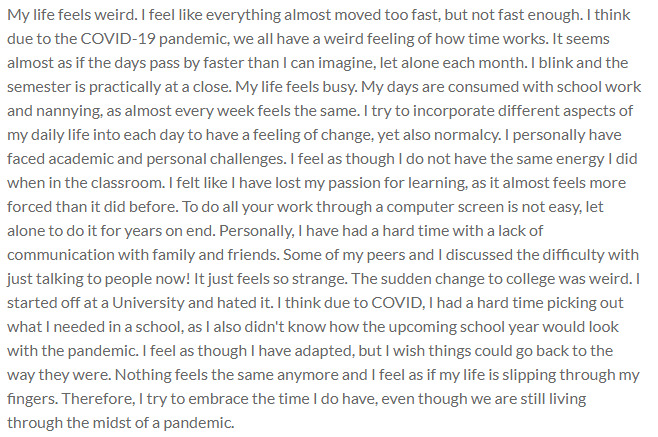 2021-12
2021-12How My Life Has Changed
My life feels weird. I feel like everything almost moved too fast, but not fast enough. I think due to the COVID-19 pandemic, we all have a weird feeling of how time works. It seems almost as if the days pass by faster than I can imagine, let alone each month. I blink and the semester is practically at a close. My life feels busy. My days are consumed with school work and nannying, as almost every week feels the same. I try to incorporate different aspects of my daily life into each day to have a feeling of change, yet also normalcy. I personally have faced academic and personal challenges. I feel as though I do not have the same energy I did when in the classroom. I felt like I have lost my passion for learning, as it almost feels more forced than it did before. To do all your work through a computer screen is not easy, let alone to do it for years on end. Personally, I have had a hard time with a lack of communication with family and friends. Some of my peers and I discussed the difficulty with just talking to people now! It just feels so strange. The sudden change to college was weird. I started off at a University and hated it. I think due to COVID, I had a hard time picking out what I needed in a school, as I also didn't know how the upcoming school year would look with the pandemic. I feel as though I have adapted, but I wish things could go back to the way they were. Nothing feels the same anymore and I feel as if my life is slipping through my fingers. Therefore, I try to embrace the time I do have, even though we are still living through the midst of a pandemic. -
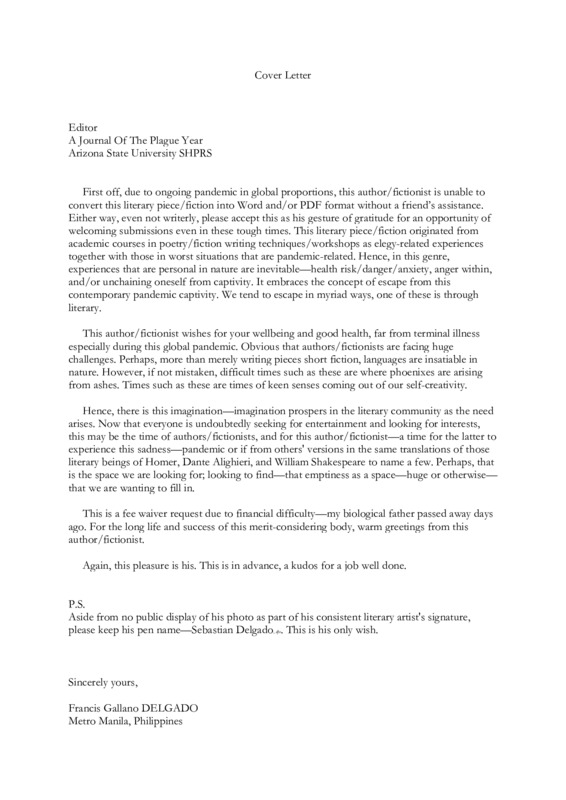 2021-12-05
2021-12-05Five Pandemic 2021 Edition by Sebastian Delgado, dps
-
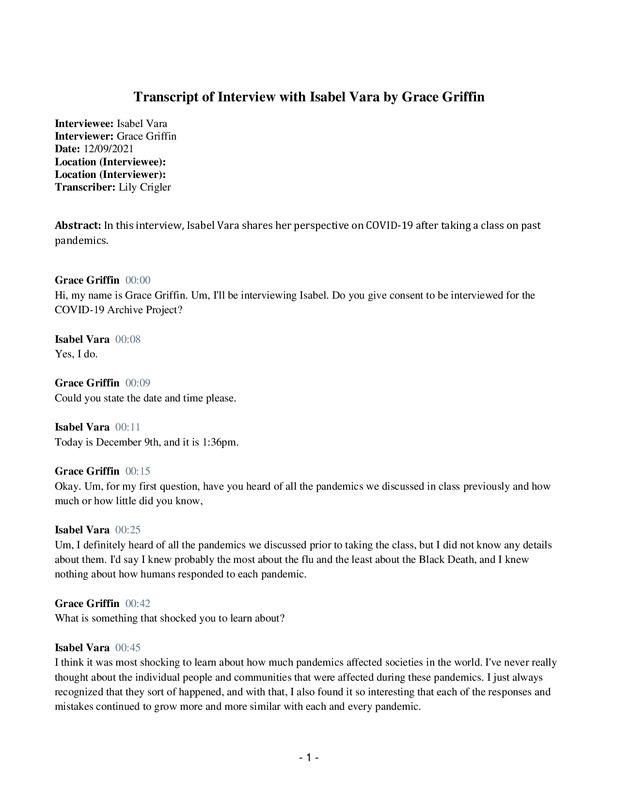 2021-12-09
2021-12-09Isabel Vara and Grace Griffin Oral History, 2021/12/09
The audios I have uploaded share different perspectives on Covid-19 after learning about past pandemics -
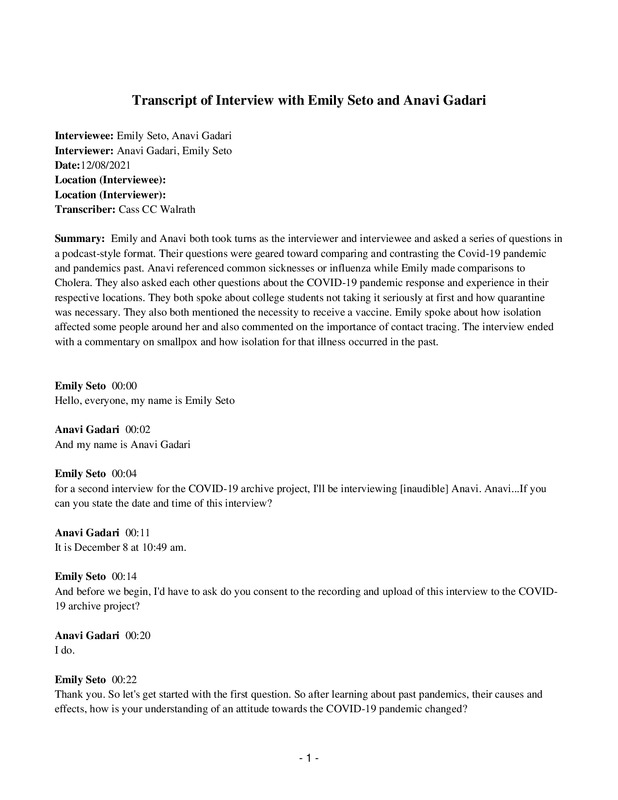 2021-12-08
2021-12-08Emily Seto and Anavi Gadari Oral History, 2021/12/08
Remembering past pandemics and comparing and contrasting them to covid-19 -
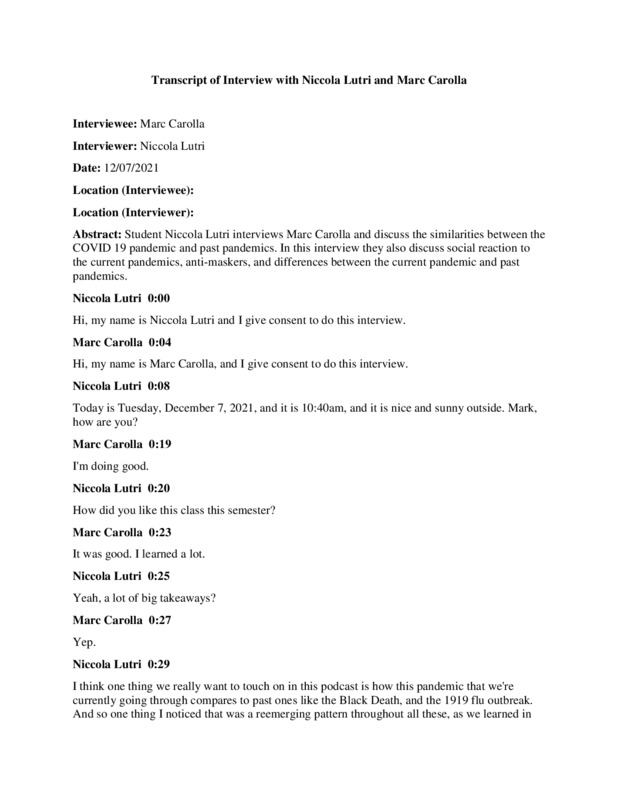 2021-12-07
2021-12-07Marc Carolla and Niccola Lutri Oral History, 2021/12/07
Marc & Niccola discuss their experiences with COVID-19 and relate it to past pandemics that they learned about in class -
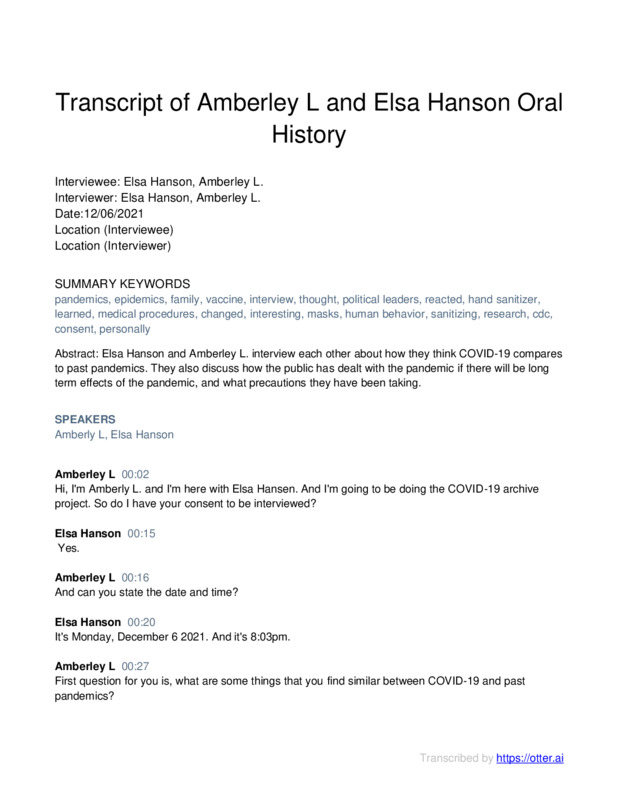 2021-12-06
2021-12-06Amberley L. and Elsa Hanson Oral History, 2021/12/06
Elsa Hanson and Amberley L. interview each other about how they think COVID-19 compares to past pandemics. They also discuss how the public has dealt with the pandemic if there will be long term effects of the pandemic, and what precautions they have been taking. -
 2021-12-03
2021-12-03Juliana Marston and Sydney Champagne Oral History, 2021/12/03
We are both students in college. In our History of Pandemics class, we learned about past pandemics (namely the Bubonic Plague, Smallpox, Cholera, and Influenza pandemics) and how they impacted society. This course also challenged us to compare and contrast the current pandemic to those of the past, while considering how mankind may fare in pandemics moving forward. We discuss these things and more in the interview recording. -
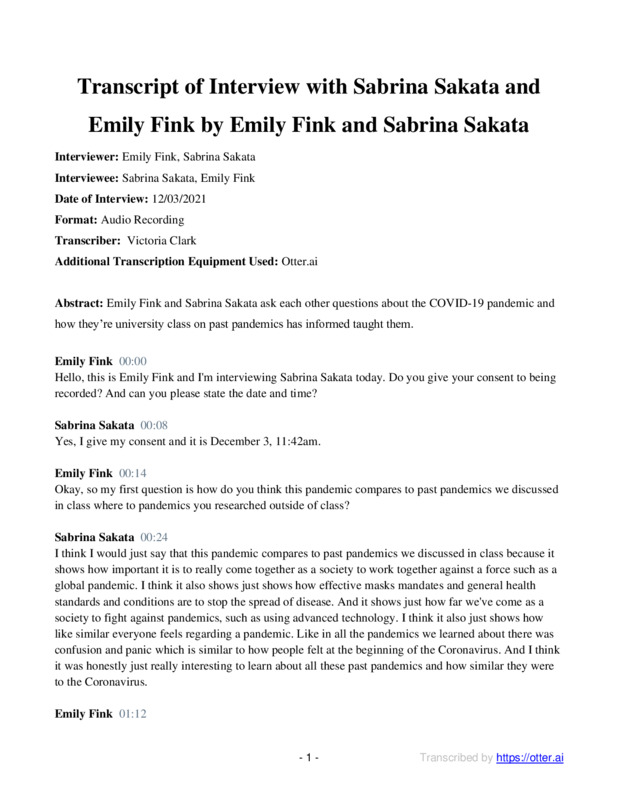 2021-12-03
2021-12-03Sabrina Sakata and Emily Fink Oral History, 2021/12/03
how past pandemics relate to the current COVID-19 pandemic -
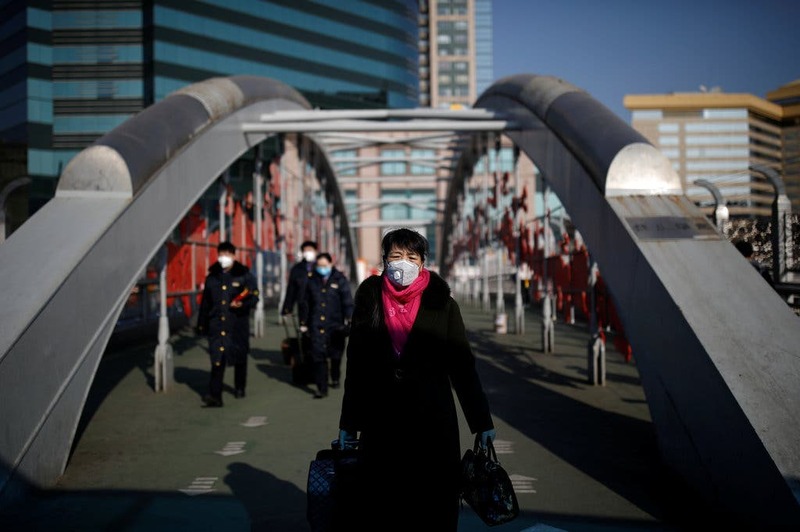 2020-01-30
2020-01-30WHO Declares Coronavirus a Global Public Health Emergency
The World Health Organization declared a global health emergency on Thursday as the coronavirus outbreak spread well beyond China, where it emerged last month. The move reversed the organization’s decision just a week ago to hold off such a declaration. Since then, there have been thousands of new cases in China and clear evidence of human-to-human transmission in several other countries, including the United States. -
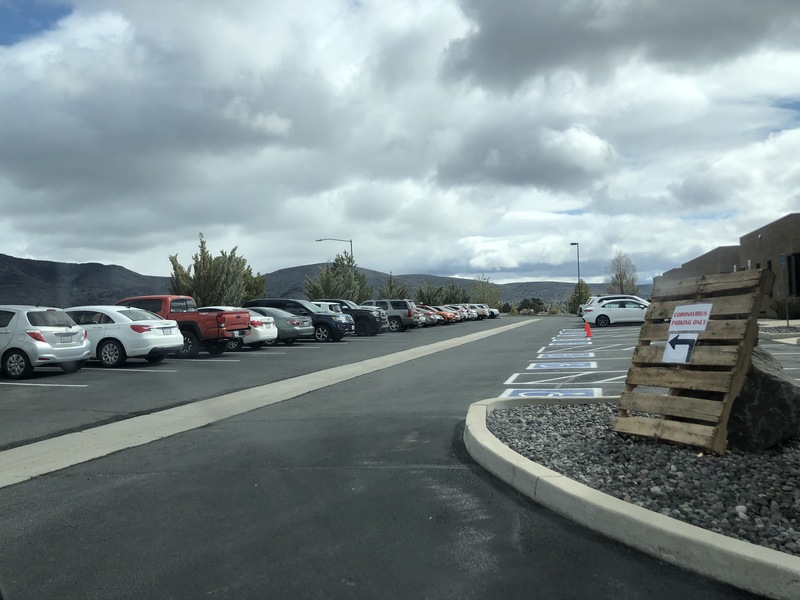 2020-03-30
2020-03-30Covid Parking
I had a friend that kept telling me that the pandemic was fake. I told her that we needed to take it serious. When I took my daughter to the local urgent care for a doctors appointment, this was the parking lot scene. I just remember being blown away at the seriousness of the situation. The urgent care separated even those that came in for covid testing from the other patients, just to keep things extra safe. -
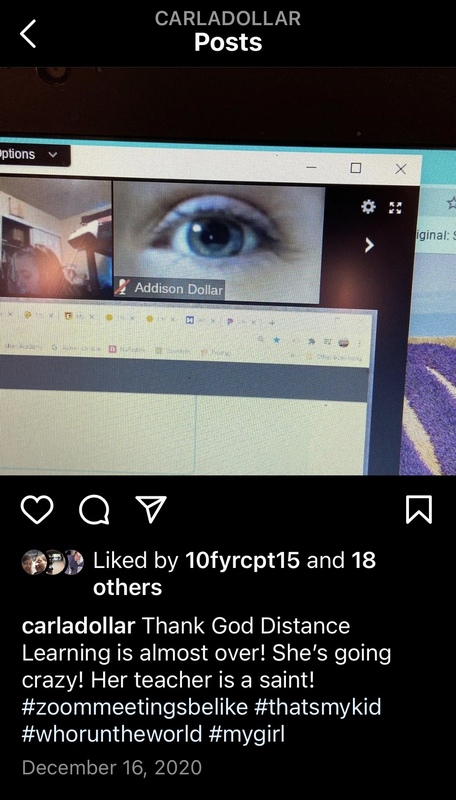 2020-12-16
2020-12-16Distance Learning Craziness
Distance Learning was not for the faint of heart. My very social daughter struggled with distance learning because she needs people. This picture I posted on Instagram. Her teacher was a saint to be able to reach the kids even though he knew full well they were going a bit crazy at home. -
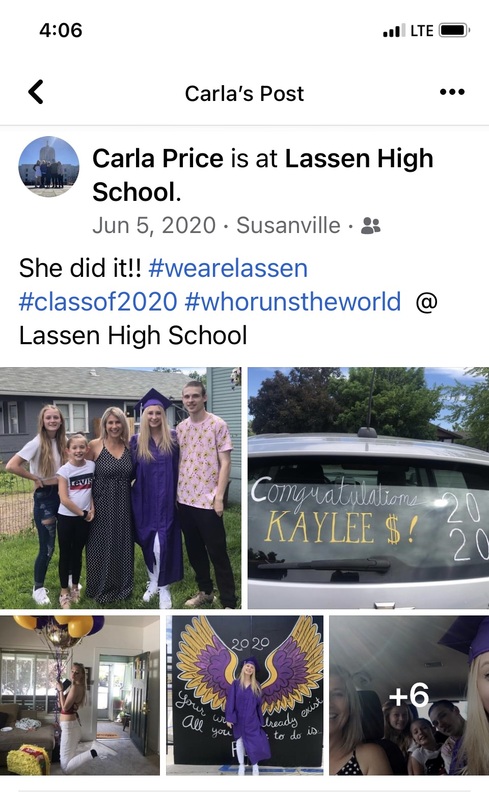 2020-06-05
2020-06-05Graduation Parade 2020
High School graduation 2020 was one for the books for sure. My daughter was a part of the class that had to deal with all of the concerns about what graduation would look like. Our high school decided to have a graduation parade. For my daughter, this was the best possible way to have a graduation. My daughter, dressed in her graduation regalia and her brother, two sisters, and myself crammed into my little car and in a procession, joined a hundred other cars for Lassen High's graduation parade. We decorated the car and honked the horn as we drove by community members lined up on the streets. Teachers were stationed all along the parade route and waved at the students, they had not seen in months. The enthusiasm was contagious. Having a girl that has social anxiety, for her, sitting by mom in the car was the best feeling. As she got out of the car to walk up the stage, she was able to thank the school counselor who invested hours to help her graduate. It was certainly a graduation to remember, and hands down, my favorite graduation to attend. -
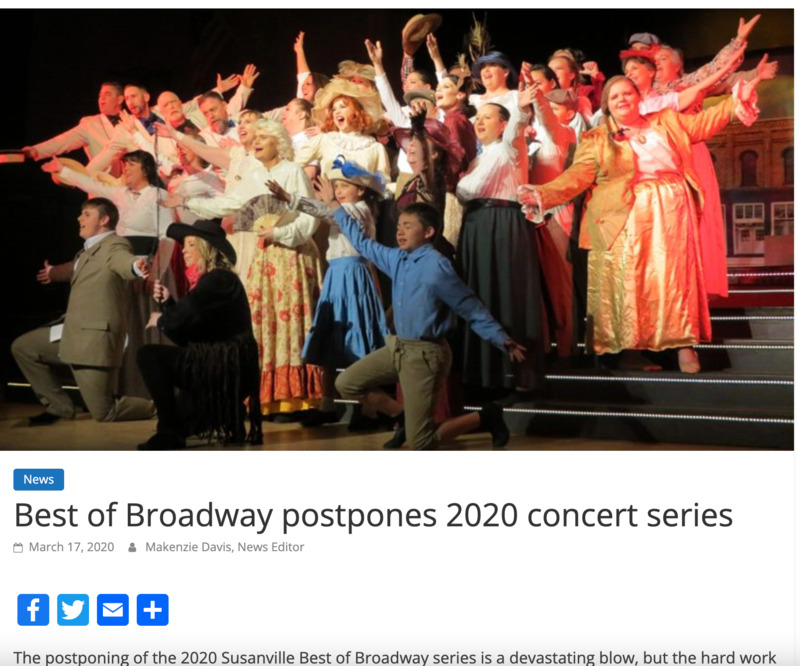 2020-03-17
2020-03-17Performance Cancelled a Day Before Opening Night
I am the board president for a local theater company, in a small town in Northeast California. For over 20 years, the production Susanville's Best of Broadway has produced a yearly concert series that features snippets from several different Broadway shows. Our production is 100% volunteer and is run by a production manager and a production team. Our cast runs over 100 people every year and includes community members of all ages. Our 2020 production was an epic year for us, as we had spent a lot f money on props, backdrops, and costumes. Several of the shows included Hamilton, Waitress, and my personal favorite Wizard of Oz (to name a few). Our production team started in April of 2019 to plan and the cast started to rehearse in January 2020. The cast would show up to rehearsals 6 days a week for 10 weeks. Two days after the pandemic was announced nationally, was supposed to be Susanville's Best of Broadway Opening Night. We schedule a total of 7 shows over two weekend. The day before opening night, our local public health team reached out to me. In a stressful meeting with the public health team and the Broadway board of directors, it was determined that we had to cancel our show. We attempted to do whatever we could to modify and change things, including social distancing, but pubic health was worried that if someone got sick from our show, we would end up with some sort of lawsuit we couldn't handle. They did, however, allow for us to present to anyone who had been at rehearsal, which included some family members and we called it a rehearsal. It was a sad night. Performing to an empty hall was sad. The cast cleaned up their belongings with hope that we would reopen in a couple of weeks. Not only were we unable to open the show, but we were unable to perform a concern series in 2021. Thankfully, plans are underway to have a performance in 2022. -
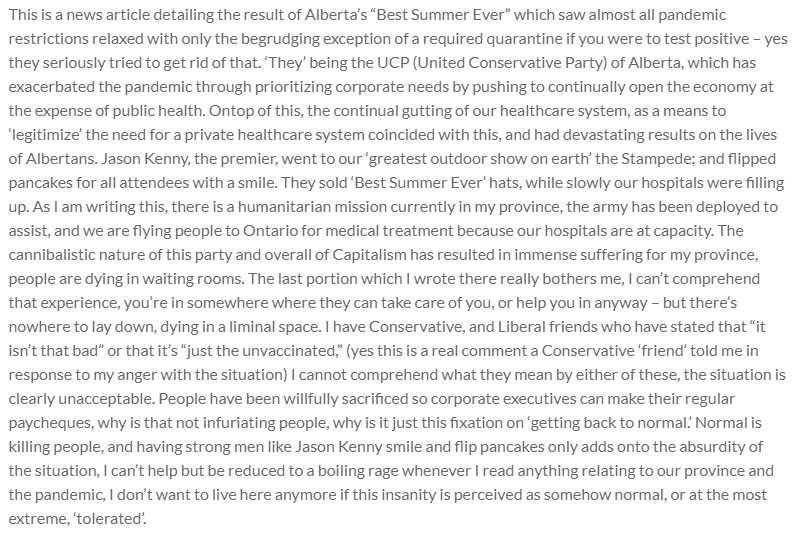 2021-09-24
2021-09-24Best Summer Ever
This is a news article detailing the result of Alberta’s “Best Summer Ever” which saw almost all pandemic restrictions relaxed with only the begrudging exception of a required quarantine if you were to test positive – yes they seriously tried to get rid of that. ‘They’ being the UCP (United Conservative Party) of Alberta, which has exacerbated the pandemic through prioritizing corporate needs by pushing to continually open the economy at the expense of public health. Ontop of this, the continual gutting of our healthcare system, as a means to ‘legitimize’ the need for a private healthcare system coincided with this, and had devastating results on the lives of Albertans. Jason Kenny, the premier, went to our ‘greatest outdoor show on earth’ the Stampede; and flipped pancakes for all attendees with a smile. They sold ‘Best Summer Ever’ hats, while slowly our hospitals were filling up. As I am writing this, there is a humanitarian mission currently in my province, the army has been deployed to assist, and we are flying people to Ontario for medical treatment because our hospitals are at capacity. The cannibalistic nature of this party and overall of Capitalism has resulted in immense suffering for my province, people are dying in waiting rooms. The last portion which I wrote there really bothers me, I can’t comprehend that experience, you’re in somewhere where they can take care of you, or help you in anyway – but there’s nowhere to lay down, dying in a liminal space. I have Conservative, and Liberal friends who have stated that “it isn’t that bad” or that it’s “just the unvaccinated,” (yes this is a real comment a Conservative ‘friend’ told me in response to my anger with the situation) I cannot comprehend what they mean by either of these, the situation is clearly unacceptable. People have been willfully sacrificed so corporate executives can make their regular paycheques, why is that not infuriating people, why is it just this fixation on ‘getting back to normal.’ Normal is killing people, and having strong men like Jason Kenny smile and flip pancakes only adds onto the absurdity of the situation, I can’t help but be reduced to a boiling rage whenever I read anything relating to our province and the pandemic, I don’t want to live here anymore if this insanity is perceived as somehow normal, or at the most extreme, ‘tolerated’. -
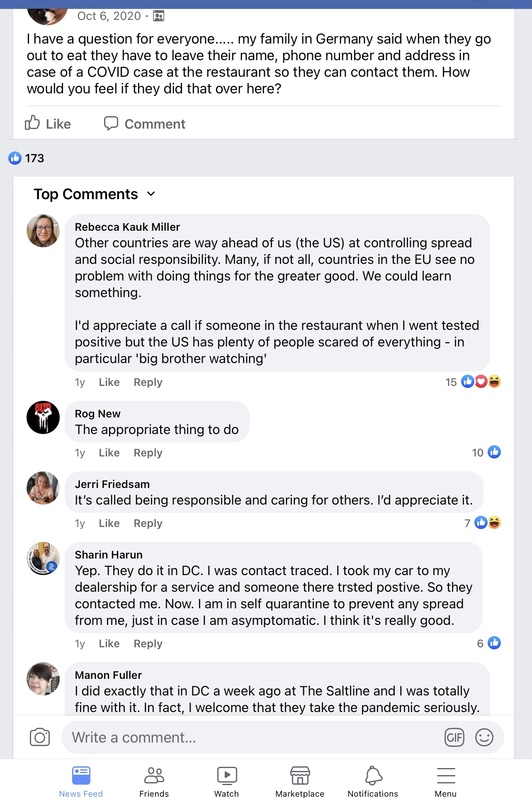 2020
2020International Discussion
This conversation was interesting to me because it is an example of how the internet has been able to give people an idea of what the pandemic has been like in other parts of the world. It also presents a strategy some leadership enacted to control the spread of the virus. -
 2021-10-07
2021-10-07Vacation in the Pandemic
This audio recording describes a vacation my family and I took during the pandemic. A lot of the attractions were closed due to the virus, so we had to find other things to do while maintaining safety protocol (social distancing, masks). It was frustrating but we managed to still have fun. -
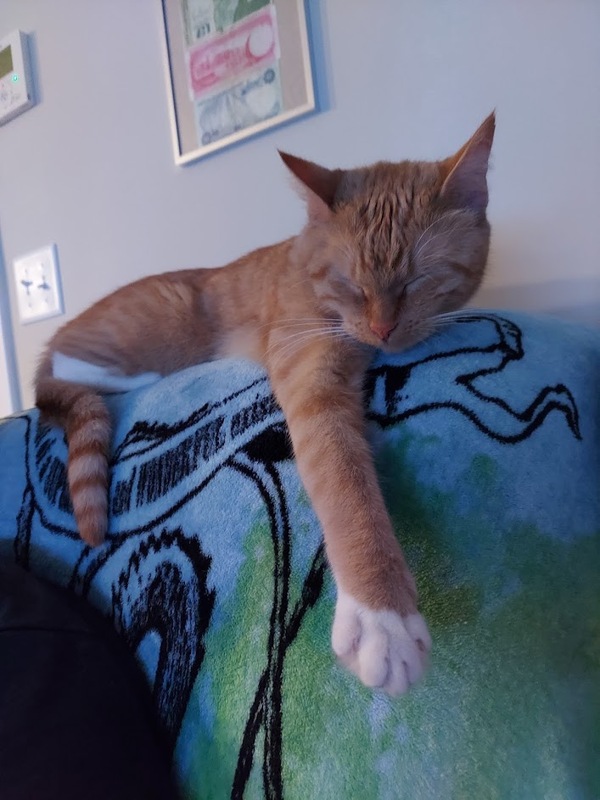 2020
2020Nervous Cats: Pandemic Pet
I first adopted my cat, Beans, in 2018, so she wasn't technically a "pandemic pet." However, she ended up becoming very anxious during the pandemic, especially with the first lockdown of March 2020, since I was home all the time! She has since developed mild "separation anxiety," and has to travel with me wherever I go. She is super adorable though :) -
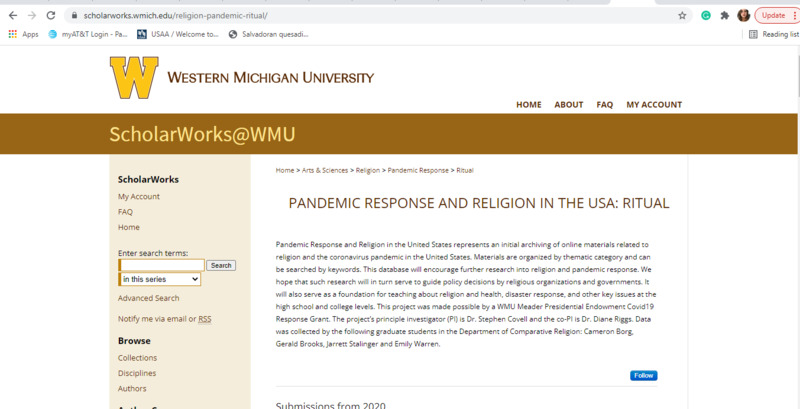 2021-07-24
2021-07-24Pandemic Response and Religion in the USA: Ritual
This digital archive consists of online materials related to the COVID-19 pandemic and religious practices during this time. -
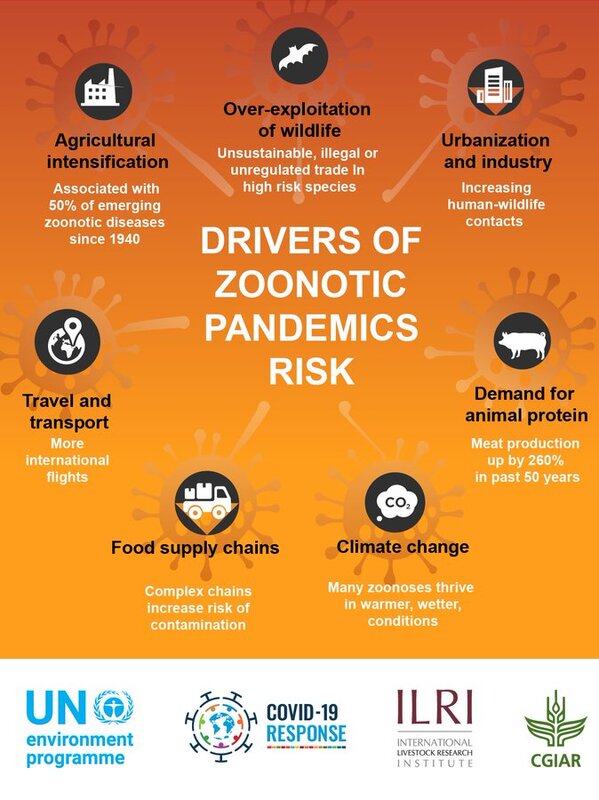 2021-07-06
2021-07-06World Zoonoses Day
This is a tweet from the UN Environment Programme showing the driving factors behind zoonotic diseases and pandemics. Humans abuse of the environment is to blame. -
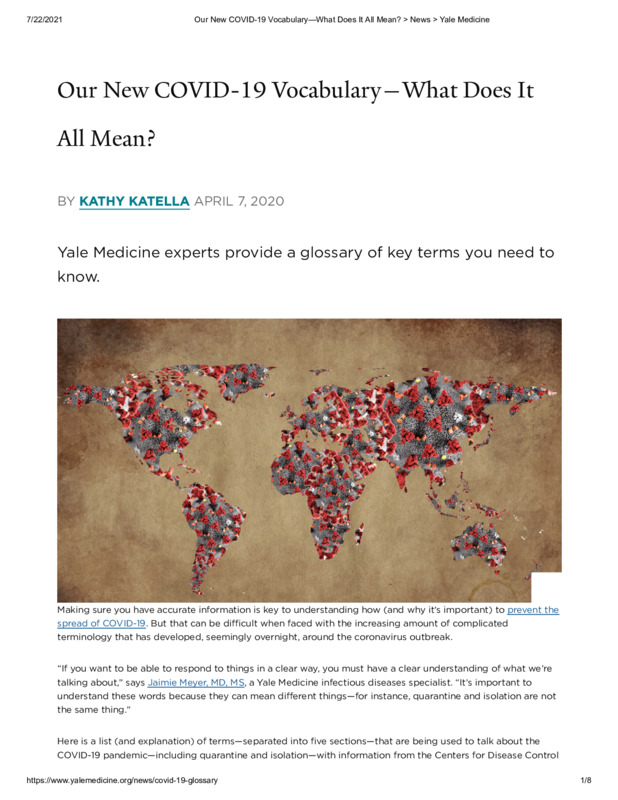 2020-04-07
2020-04-07Our New COVID-19 Vocabulary—What Does It All Mean?
Before the pandemic, most people didn't know many of the terms associated with epidemic diseases and SARS-type viruses. In order to understand what was happening, people had to quickly acquire a whole new vocabulary. This article from Yale Medicine helps define some of the most critical and widely used terms. -
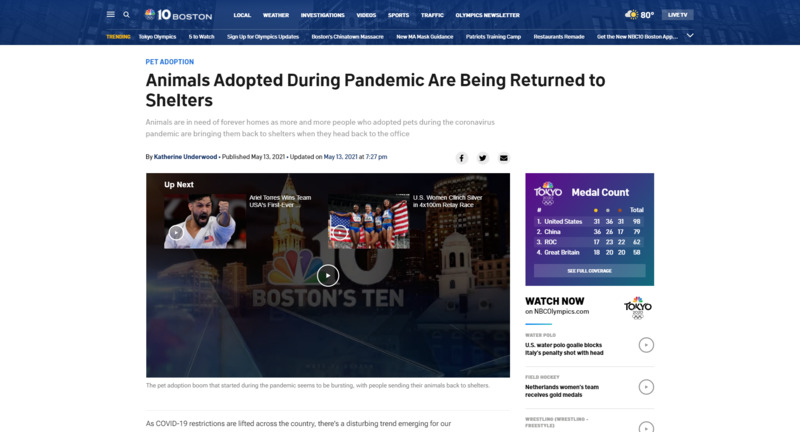 2021-05-13
2021-05-13Pandemic Pets Return to Shelters
Sadly, as the nation returns to work and activities, pets adopted during the pandemic are paying the price. According to the article, owner surrenders are up more than 80% from this time last year. People did not think far enough ahead about what would happen once the pandemic was over. Now its the poor animals who have to pay the price. When will people learn that animals are not toys to be thrown away when it becomes inconvenient?
